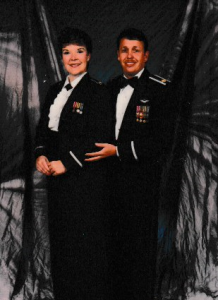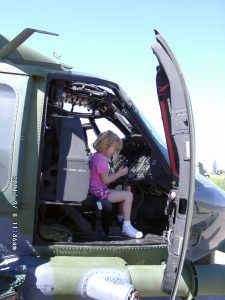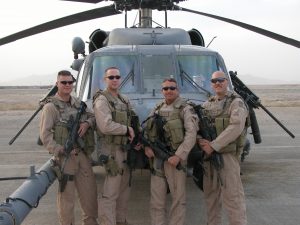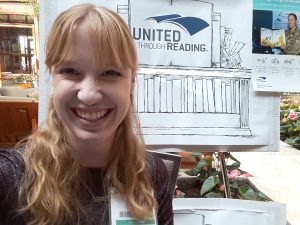
Major Hawvermale and Major Wilson-Hawvermale, 1994
Author: Erica Hawvermale
I come from a line of military service – at least one person in each generation has served in our armed forces dating back to WWI. My mother retired as an Air Force Major soon after I was born, and my dad, who piloted helicopters for 26 years, retired as an Air Force Lieutenant Colonel around the time I entered middle school. For my early life, I was surrounded by the military and the military community. I grew up regaled by family stories of the adventures my parents had while stationed in Germany and South Korea, as well as my mother’s time in Panama as a military brat herself. Like other military children, I experienced the challenges as well as the joys of being in a military family: we moved every 3-4 years, requiring me to change schools and leave friends. My dad had routine weekend training, night flight drills, and would occasionally deploy overseas, all of which disrupted our routines. However, like so many military families, we learned resilience… and I became used to the ebb and flow of our lives around my dad’s missions.
In many ways I count myself extremely lucky – I had the opportunity to experience the civilian world as well as the military. With my dad’s retirement came stability. For the first time in my life, I was able to count on the fact that I would remain with my same friends from middle school through to graduation. My extracurricular activities were not disrupted, and my parents both found jobs as educators in our local school district. But, I still brought with me what many military children do: a high respect for authority, determination, the flexibility to adapt to challenges, personal drive, and a sense of responsibility.

Erica Hawvermale, 2001
My family’s connection to the military has always been a source of pride for me, and I knew that service, in some form, was something I wanted for myself as well. When I went to college, I had my plan set: I would get my undergraduate in biology, attend the Uniformed Services University of Health Sciences, and become a doctor in the Air Force. To make a long story short, I graduated in cultural anthropology, and now have a master’s degree in applied anthropology, both of which are a far cry from medicine.

Lt. Col. Hawvermale and crew, 2004
When I told my parents I was changing my major from pre-med biology to anthropology, I expected the rhetoric that most anthropology majors get: “What are you going to do with that? How are you planning to make a living for yourself?” Instead, they were incredibly supportive. However, I was unprepared for my dad’s response: “Do you know what you can do with a degree in anthropology? You can fly helicopters for 26 years with the Air Force.” (What a way to learn what my father had majored in!) Although I did not go on to become a helicopter pilot, I didn’t have to put my dream of working with the military completely aside.
During my master’s program I connected with United Through Reading, an organization that helps service members record themselves reading books for the children in their lives. As I helped them with an impact evaluation, I was struck by how meaningful that kind of interaction would have been to me growing up. My dad and I would read together often, but we lacked a strong method of communication when he was deployed; I have distinct memories of taking photos of my third-grade report card in the era before instant messaging and video chat platforms – we emailed it. I could see the incredible impact of this non-profit, and I was hooked. I went on to volunteer my time conducting Our Military Kids annual survey, and I finally landed a dream job as an Evaluation Associate at the IVMF, helping other non-profits evaluate their programming to better serve veterans and military families.
I firmly believe I would not have found myself on this path if I did not see daily the impact that military service has had, for better and for worse, on my family.

Erica volunteering for United Through Reading, 2019
A lot has changed since my family left active service. Technology has evolved, and we have more organizations than ever positioned to help military families connect, communicate, and navigate what it means to be military. But many of the challenges still remain. Although many of these challenges are well-researched, there are important gaps in our knowledge – Guard and Reserve children experience different challenges than Active-Duty youth. And we know very little about the impact living with and caring for a wounded veteran has on military kids. These are the areas we will need to expand in order to better fulfill our service to those who serve.

